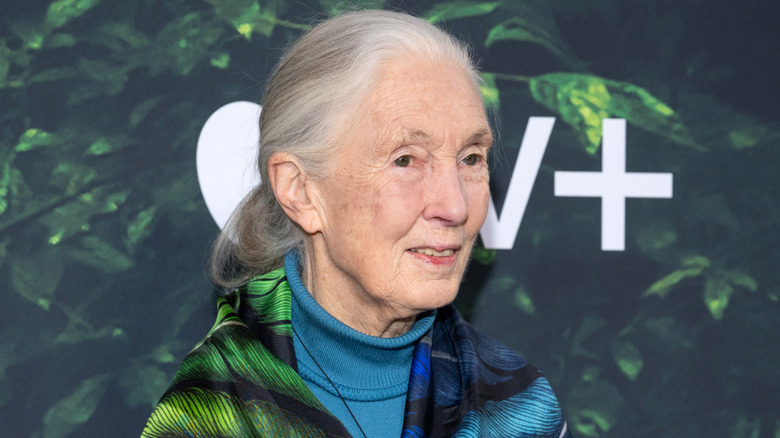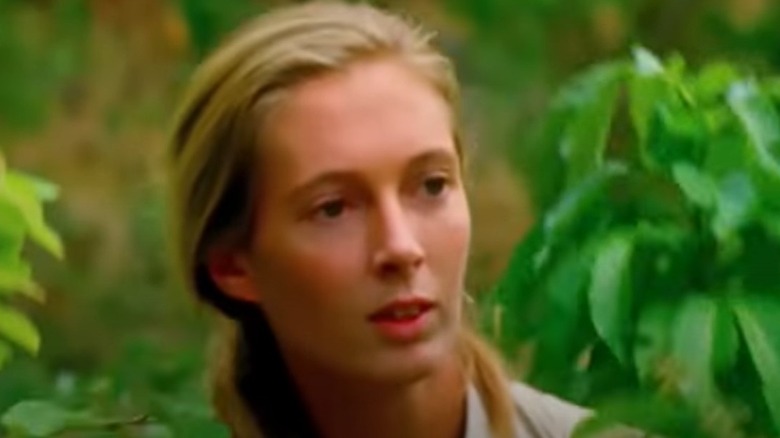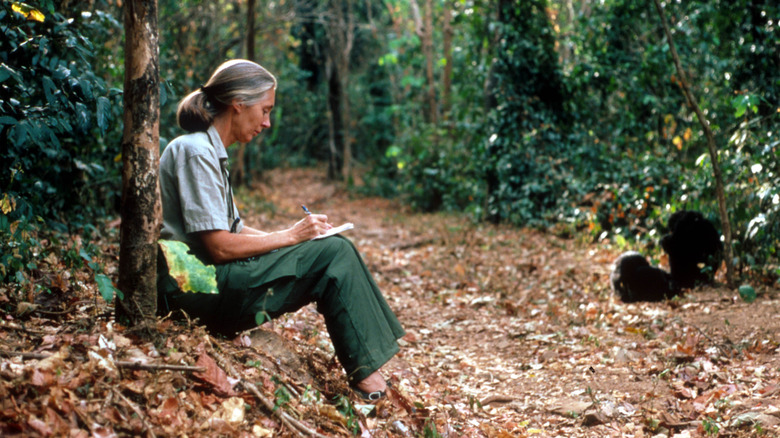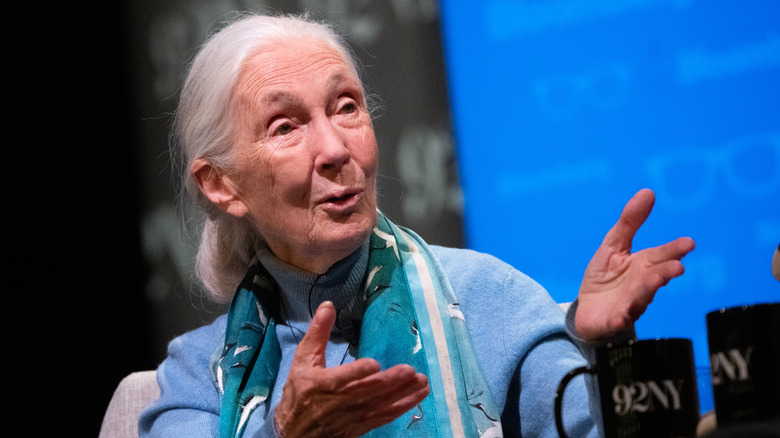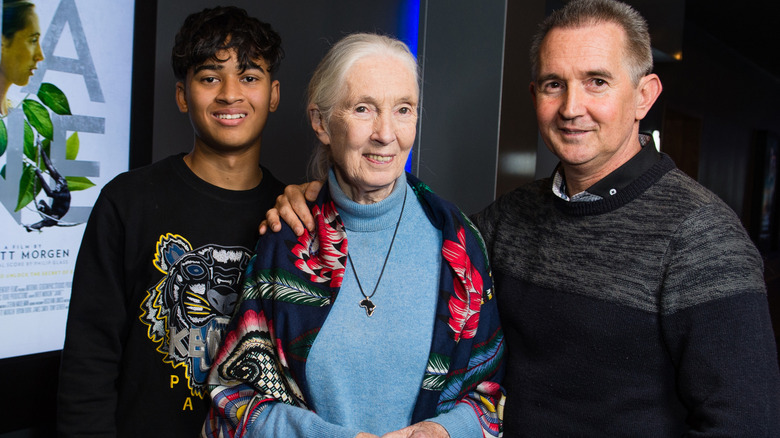Jane Goodall, British Primatologist And Conservationist, Dead At 91
Jane Goodall, British primatologist, has died at age 91 on October 1, 2025, according to The Jane Goodall Institute. Goodall's official Instagram account announced the news, saying she "passed away due to natural causes." Goodall was in California for a speaking tour at the time.
As an ethologist, conservationist, and activist, Goodall devoted her life to the protection and preservation of chimpanzees and their environments. She was perhaps most famous for her groundbreaking discoveries regarding chimps, having disproved previous theories that humans are the only animals to use tools and have complex social structures. "The only way we can begin to understand early man's behavior is by comparative studies with these chimps," she told The Washington Post in 1978. "It is only through these chimps that you can begin to understand the evolutionary processes that molded our behavior as it is today."
Goodall revealed in an interview with Ellen DeGeneres that breaking into the scientific world wasn't easy, even though she made it seem like it was. "You know, we weren't scientists in those days — women," she said. "And everybody laughed [at me] except my mother. And what she said to me is what I say to young people around the world. 'If you really want this, you have to work really hard, take advantage of all opportunities, but don't give up.'" And so she did.
Jane Goodall's early love for animals
When Jane Goodall was just a year old, her father, Mortimer, gifted her a toy chimpanzee. This was to celebrate the occasion of a baby chimp being born at the London Zoo, according to the Jane Goodall Institute. Goodall loved the toy and carried "Jubilee" (the name she gave it) with her everywhere. Goodall's love for animals only grew from there. Once, as a young child, unaware that her parents were searching for her, she waited in her family's hen house for hours trying to learn where eggs came from.
It didn't take long for a dream to manifest itself — to live in Africa, where Goodall could observe and write about animals. The journey to get there, however, was non-linear. Upon finishing high school, Goodall couldn't afford to attend college and instead became a secretary at Oxford University. After that, she worked for a filmmaking company.
An unexpected opportunity arose in 1956, when Goodall received an invitation to her friend's family farm in South Kinangop, Kenya. Goodall quit her job and became a waitress, saving up money for the trip. A year later, at 23 years old, she traveled to Kenya by boat.
Jane Goodall's chimpanzee discoveries
During her first trip to Kenya, Jane Goodall met the famous anthropologist and paleontologist Dr. Louis Leakey. Leakey was so impressed with Goodall's knowledge of Africa that he hired her as his assistant, teaching and mentoring her along the way, per the Jane Goodall Institute. Though Goodall could've become a paleontologist, she set her sights on her childhood dream, and Leakey helped her get there. Leakey felt the study of primate species could help humans understand their ancestors. Few studies had been successful at that point. Leakey believed Goodall's temperament was ideal for a long-term study that required the utmost patience.
However, British authorities were reluctant to allow a young woman to travel on her own in Africa, according to the Jane Goodall Institute. They finally agreed when Leakey suggested that Goodall's mother, Vanne, and a cook accompany her. In July 1960, Goodall's childhood dream came true as she traveled to Tanzania to study chimpanzees. Although the chimps initially fled whenever Goodall came within 500 yards, she learned how to observe them in a non-threatening manner. She gradually got as close as 30 feet to their feeding area over the course of a year. In two years, the chimpanzees fully accepted her presence and even came up to her looking for bananas.
Jane Goodall's work beyond chimpanzees
Beyond the groundbreaking discoveries she made during her studies at the Gombe Stream Chimpanzee Reserve in Tanzania, Jane Goodall worked as a conservationist, activist, and educator. She became a PhD candidate at Cambridge University in 1962 and was one of few people accepted without an undergraduate degree, per the Jane Goodall Institute. In 1965, she earned her PhD in ethology, the study of animal behavior.
Goodall became alarmed in the 1970s and 1980s at the destruction of habitat in Tanzania caused by mining and logging, as well as impoverished locals stripping the agriculture for farming, per Live Science. In response, she founded the Jane Goodall Institute, a global non-profit organization that preserves chimp habitats and helps the local communities surrounding them.
In 1984, Goodall also founded ChimpanZoo, an international research program aimed at studying chimpanzees in captivity and improving their lives, per Lion Country Safari. And after learning about the extent of the habitat destruction in Africa at a 1986 conference in Chicago, Goodall decided to leave the Gombe Reserve in order to devote her time to conservation efforts, as noted by the Jane Goodall Institute.
Jane Goodall's personal life
In 1963, National Geographic sent photographer and filmmaker Hugo van Lawick to the Gombe Reserve in Tanzania to document Jane Goodall's life and research, according to the Jane Goodall Institute. Goodall and van Lawick fell in love and decided to marry in 1964. "Hugo and I seemed perfect," Goodall told People in 2020. "We both love animals. We both loved being in the bush." In 1967, Goodall gave birth to her first and only child, Hugo Eric Louis, whom family and friends affectionately called "Grub."
After 10 years of marriage, however, Goodall and van Lawick divorced. Goodall recalled things started to fall apart after National Geographic stopped funding van Lawick's work in Tanzania, and he was forced to leave. A year later, Goodall married Derek Bryceson, a Tanzanian parliament member and the director of Tanzania's national parks, per People. Unfortunately, Bryceson died from cancer only five years later.
Goodall told People that she didn't feel the need to marry again after 's Bryceson death. "I didn't want to. I didn't meet the right person, I suppose, or potentially the right person," she said. With everything that Goodall had accomplished, she felt as though her life was already full, and another marriage wouldn't bring her more fulfillment. In addition to her son, Hugo, Goodall is survived by her sister, Judith, and her three grandchildren — Merlin, Angel, and Nick — per Earth Necklace.
